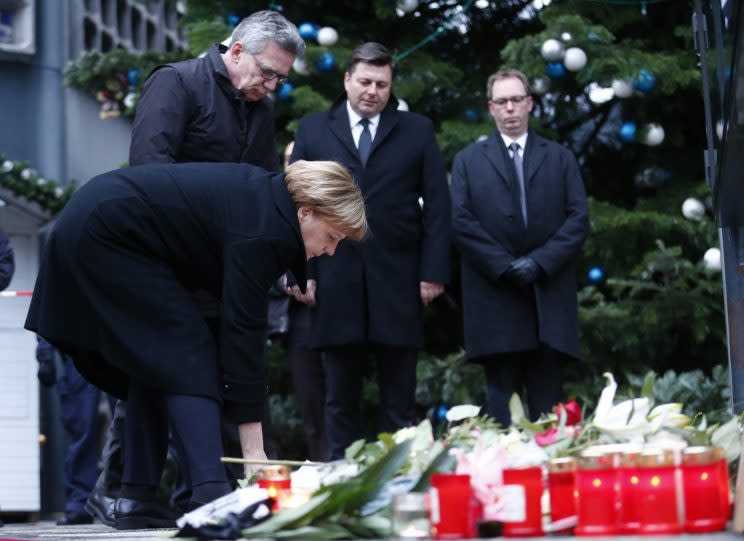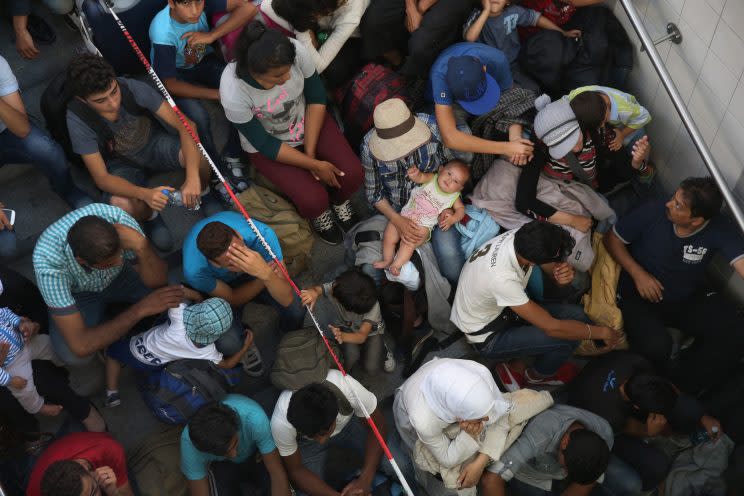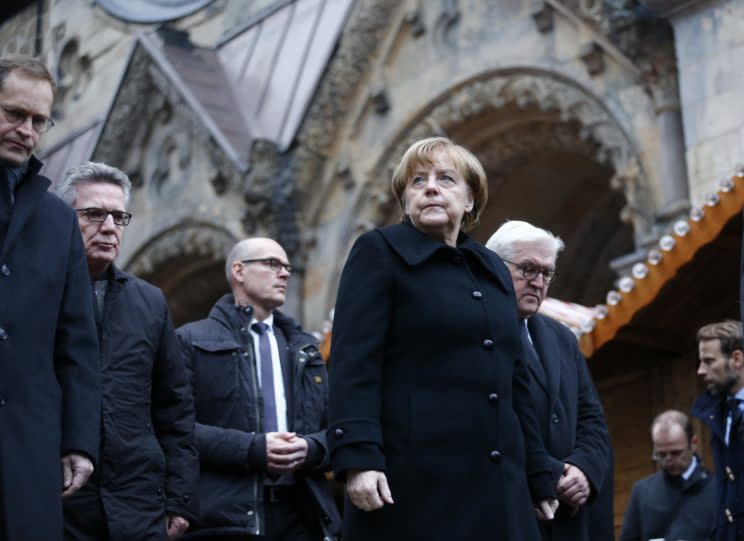Germany’s refugee policy under scrutiny after Berlin attack
Tensions over Germany’s large migrant community reignited after authorities detained an asylum-seeker from Pakistan in connection with the deadly truck attack that killed at least 12 and injured nearly 50 at a bustling Christmas market Monday.
Chancellor Angela Merkel, who has faced criticism for opening Germany’s borders to more Middle Eastern refugees than any other European nation during the current crisis, said it must be assumed that the incident outside Berlin’s Kaiser Wilhelm Memorial Church was a “terrorist attack” and was quick to acknowledge the possibility that an individual who entered the country under the guise of seeking refuge might be responsible.
Slideshow: Truck attack at Berlin Christmas market >>>
“I know that it would be particularly hard for us all to bear if it were confirmed that a person committed this act had asked for protection and asylum in Germany,” Merkel said on Tuesday. “This would be particularly sickening for the many, many Germans who work to help refugees every day and for the many people who really need our help and are making an effort to integrate in our country.”
The Islamic State terrorist group claimed responsibility for the attack in a statement later Tuesday, saying, “the person who carried out the truck run over attack in Berlin is a soldier of the Islamic State and carried out the attack in response to calls for targeting citizens of the Crusader coalition.”
The initial suspect, 23, entered the country on New Year’s Eve in 2015 and reached Berlin in February 2016, the Associated Press reported. He denied involvement in the attack, leading authorities to first announce they were uncertain they had the right person and finally to release him, citing insufficient evidence.
Nevertheless, the attack has revitalized conversations in Western countries about the potentially dangerous consequences of providing a haven for refugees.

Where are the refugees coming from?
Eurostat, the European Union’s statistical agency, reports that a record-setting 1.2 million first-time asylum seekers applied for international protection in the 28 member states of the European Union in 2015 — more than double the previous year.
The three main countries of origin for people seeking asylum in 2016 were Syria, Afghanistan and Iraq — with people from those countries comprising over half of first-time applicants. Compared with the previous year, the number of Syrians seeking protection doubled to 362,800, the number of Afghans nearly quadrupled to 178,200 and the number of Iraqis multiplied by seven to 121,500.
Nearly 1 out of 3 first-time asylum seekers come from Syria and nearly half of them (158,700) registered in Germany.
Despite these large numbers, according to the Pew Research Center, only 1 in 10 displaced Syrians have taken residence in Europe. The vast majority of Syrians are displaced internally or living in neighboring countries.
How many are relocating in Germany?
In 2015, the highest number of first-time applications for asylum was registered at 441,800 in Germany, Eurostat reported. This unprecedented figure accounts for 35 percent of those registered in the EU member states and represents a 155 percent increase over the 172,945 applications registered in 2014.
After Germany, the other top nations for accepting refugees were Hungary (174,400, or 14 percent), Sweden (156,100 or 12 percent), Austria (85,500 or 7 percent), Italy (83,200 or 7 percent) and France (70,600 or 6 percent).

According to a Pew Research Center analysis of the data, Germany has been the primary destination for asylum-seekers since 2012 — a position it previously held in the late 1980s and 1990s when it received nearly half of Europe’s asylum applications. Over the past 30 years, at least 3.6 million applications were filed in Germany. That’s nearly one-third of applications in Europe for that time frame.
Germany’s Institute for Labor Research released data on Monday that suggests refugees have had a difficult time finding full-time employment within the country. The research shows that only 34,000 refugees have been able to find work over the past year and 22 percent of those are on temporary contracts, Der Spiegel reported.
Conservative reaction
Merkel’s policy of admitting hundreds of thousands of refugees has already been criticized as a possible mode of entry for jihadists disguised as refugees. The attitude toward migrants in Germany changed after a series of attack on civilians, several of which were carried out by migrants. In July, for instance, an Afghan refugee attacked train passengers with an axe and knife, a Syrian refugee killed one person and injured three with a machete and another Syrian refugee blew himself up near a music festival.
Merkel has received no shortage of international accolades for her refugee policies. President Obama praised her as being on the “right side of history,” and Time magazine said she provided “steadfast moral leadership in a world where it is in short supply.”

The influx of predominantly Muslim migrants has led to a boost in support for conservative and nativist political groups in Germany and abroad. Populist politicians have given voice to this concern, arguing for stronger borders and calling for the accepting of refugees to be halted.
Shortly after the attack, Marcus Pretzell, a member of the European Parliament for the Alternative for Germany, which is right-wing and skeptical of the European Union, tweeted that Merkel has blood on her hands and that Germany’s rule of law must prevail.
Translated to English, his tweet read, “When does the German state strike back? When does this cursed hypocrisy finally stop? They are Merkel’s dead!”
Wann schlägt der deutsche Rechtsstaat zurück? Wann hört diese verfluchte Heuchelei endlich auf? Es sind Merkels Tote!#Nizza#Berlin
— Marcus Pretzell (@MarcusPretzell) December 19, 2016
According to AP, Frauke Petry, co-chair of the Alternative for Germany party, said, “Under the cloak of helping people Merkel has completely surrendered our domestic security,” and Manfred Weber, the head of the largest center-right group in the European Parliament, told German public broadcaster ARD that it’s important to make sure extremists do not enter Germany: “The state must be able to check every refugee who comes here.”
This skepticism toward accepting refugees from war-torn countries is not exclusive to Germany. It’s symptomatic of a larger trend toward nativism that’s been seen in various countries throughout the West.
Nigel Farage, the former leader of the U.K. Independence Party and an outspoken supporter of Brexit, said that Merkel’s legacy will be defined by horrific incidents like the attack in Berlin.
Terrible news from Berlin but no surprise. Events like these will be the Merkel legacy.
— Nigel Farage (@Nigel_Farage) December 20, 2016
In a statement, U.S. President-elect Donald Trump extended his heart and prayers to the victims’ loved ones and denounced the terror attack on innocent civilians preparing to celebrate Christmas.
“ISIS and other Islamist terrorists continually slaughter Christians in their communities and places of worship as part of their global jihad,” Trump said. “These terrorists and their regional and worldwide networks must be eradicated from the face of the earth, a mission we will carry out with all freedom-loving partners.”
Marine Le Pen, the president of the National Front, a far-right nationalist political party in France, called for her nation to stop relocating “migrants” in their towns and villages and for their national borders to be restored immediately, the Local reported.
“How many massacres and deaths will be necessary for our governments to stop bringing in a considerable number of migrants into our communities without borders, when we know that Islamist terrorists are among them?” she said, according to the digital publisher.




